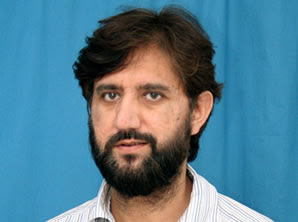
Young Indian filmmaker Rajesh S. Jala’s new documentary Children of the Pyre (2008) has recently won the best documentary film award at this year’s Montreal Film Festival. This documentary features about 7 children working at Manikarnika, Banaras, India’s busiest, most sacred and ancient cremation ground.
Though this director-producer-cinematographer relishes the honour, it behoves his hard work. Rajesh has been making films, primarily documentaries, for the last 11 years. He has directed more than 10 documentary films and a number of television series for leading international and Indian television channels. One of his earlier documentary films Foating lamp of the shadow valley (2006) was nominated at the International Amsterdam Film Festival and was officially selected at the Palm Spring Film Festival, US and the Raindance Film Festival, London.
Here’s an exclusive interview with the young filmmaker:
How did "Children of the Pyre" come about? What attracted you to this serious theme?
For many years I was keen to make a film on Banaras. Two years back I went to Banaras for a recci and I spent a month there. And during this period I got an opportunity to meet these extraordinary 7 children. Immediately I decided to do this film. This unusual subject, children working at the busiest cremation ground in India, attracted me to do this film.
Was it a difficult subject to research and write on? Or did you shoot the film first and then edited it down to whip out a meaningful narrative?There wasn't much of research involved. We followed the children for 18 months (off and on), and shot more than 100 hours of footage. The film is a self-narrative of these kids who narrate their lives very candidly. And it took us 7 months to edit the film.
As has been mentioned elsewhere, you took several months to shoot and edit the documentary. When you were making the documentary, what was going through your mind?This film has left a deep impact on me. Filming at a cremation ground, where almost 150 dead bodies are cremated each day was one of the most difficult experiences I have gone through. Especially in the beginning it was an emotional torture to shoot at this cremation ground. Dead bodies coming after every 10 minutes with the chants of Ram naam satya hai (Lord Rama’s name is the truth) echoing in the air almost created a haunting environment. During the peak summer schedule last year, the temperature at the ground was above 50 degrees and we shot for many days. The whole crew got sick. Our energy was drained out. I was limping and I could hardly talk.
What sort of relationship developed between you and the principal characters of your film? Did you face any hurdles in shooting as Varansi is a religious place?Initially the kids treated me like any other visitor but when they saw me spending most of the time with them, following them through days and nights, their perception changed and so did their approach towards me. Gradually we became friends.
Shooting at Manikarnika cremation ground was the biggest shooting challenge in my 11 years of filmmaking career. Besides physical and emotional challenges, there were lots of hurdles we had to go through. At times we had to face the wrath of the relatives accompanying the dead body. And some times the local cremators or touts would intimidate us. But gradually, we built up a good rapport with the locals and eventually, almost everybody supported us.
Did you expect to win accolades (such as the best documentary film award at Montreal film festival) when you were working on the film? How do you feel getting appreciated for your work?When I was making the film I didn't think of winning awards. But I was hopeful that this film would generate awareness about this extreme form of childhood. Thankfully, I am getting a lot of appreciation and it really encourages me.
More here




